As is customary this time of year, here are the Rude VC summer reading recommendations. For reading lists from prior years, see 2018, 2017, 2016, 2015, 2014, 2013, 2012).
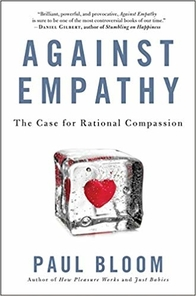
Against Empathy, by Paul Bloom
I admit that I immediately judged this book based on its title. As long-time readers of this blog might recall, I’ve ranted publicly in the past about how the word empathy had become such an overused cliché (especially by tech firms and VCs) that it had lost all meaning. However, despite my complaints, I still viewed the concept of empathy in its purest definition to be a virtue. So when I noticed a book entitled Against Empathy, I could not resist reading it, certain that I disagreed with its core premise. I began the book as a skeptic, but gradually, Bloom won me over with his logic, at least partially.
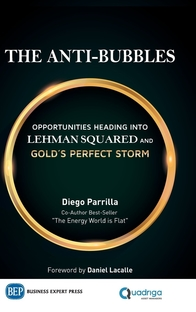
The Anti-Bubbles, by Diego Parrilla
I recall paying close attention as a directly concerned person to the crisis of the Euro in summer 2012, but it wasn’t until reading The Anti-Bubbles that I appreciated the connection to the earlier Quantitative Easing programs implemented by the U.S. Fed during the financial crisis. Not only is Parrilla’s book a delightful read, I’m keeping it handy as a road map (or a parachute?) as complacent faith in central banks’ infallibility might well drive developed economies over a cliff. The paradigm of “risk-free interest” that we learned in business school may now well have been replaced by a paradigm of “interest-free risk.” Venturing into negative interest rate territory is as radical as determining that 0 Kelvin is no longer absolute zero temperature. Parrilla demonstrates why he’s one of the most original and lucidly contrarian thinkers around today. Highly recommend.
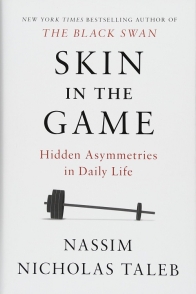
Skin in the Game, by Nassim Nicholas Taleb
Also addressing the notion of misalignment in risk-taking, Taleb apparently wrote Skin in the Game as a reaction to all those financiers who misappropriated his earlier Black Swan
concept as cover for their reckless trades leading up to the Lehman
shock. During the financial crisis, everyday people on Main Street
witnessed with outrage as bankers on Wall Street found a way to
socialize their losses after years of personal enrichment on their risky
bets. Much as in The Anti-Bubbles, Skin in the Game
is full of nuggets of wisdom, such as the incentive of politicians to
make regulations complex because their expertise will be in high demand
from the private sector when they leave public office. Taleb also
presents a skewering dismantling of Thomas Piketty’s flawed logic in Capital in the Twenty-First Century.
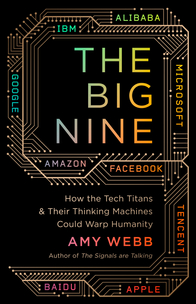
The Big Nine, by Amy Webb
Futurist Amy Webb intended The Big Nine be a wake-up call for the potential consequences of the race to advance artificial intelligence. Her largely well-supported premise is that AI research is and will remain dominated by 9 actors unless we do something to correct course: 6 companies in the U.S., and 3 in China. In the U.S., the G-MAFIA (Google, Microsoft, Amazon, Facebook, IBM, Apple) have established an insurmountable lead in AI innovation. Although their intentions may be benevolent, they operate in service to shareholder value, while U.S. regulators remain asleep at the switch. China also boasts three AI-dominant tech firms: Baidu, Alibaba, Tencent; whereas in contrast to the U.S., the Chinese government wields significant influence and has mastered the art of the long game. Perhaps the only major blemish in this otherwise brilliant book is Webb’s total blind spot to AI policy in other countries, notably in France, where corporate leadership in AI certainly trails China and the U.S., yet where public policy is more thoughtful and may inspire some of the solutions Webb advocates.
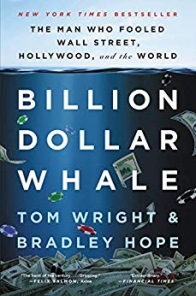
Billion Dollar Whale, by Tom Wright and Bradley Hope
“If you enjoyed reading Bad Blood, you’ll love Billion Dollar Whale,” my friend in Singapore assured me. Much like in Bad Blood, there’s a mind-blowing scandal (Theranos in Bad Blood; the 1MDB fraud in Billion Dollar Whale), a villain (Holmes/Balwani; Jho Low), and a cast of enablers who make you wince (e.g. George Shultz; Goldman Sachs). Also similar to Bad Blood, Billion Dollar Whale reads like a spy thriller, with events so crazy they could have no place in fiction. One stark difference between the two accounts: the main perpetrators of Theranos have been apprehended, whereas the key perpetrator behind 1MDB still remains at large.

Alamut, by Vladimir Bartol
A business colleague recommended Alamut to
me several years ago contending its timeliness in light of world
events. I finally got around to reading it late last year and submit
that it’s still timely. Slovenian author Vladimir Bartol originally
wrote this compelling story, set in 11th century Persia, in 1938, as an
allegory to Mussolini’s fascist state. In the 1960’s Alamut became
a cult favorite throughout Tito’s Yugoslavia, and in the 1990s, as an
allegory of the region’s strife during the Balkan’s War. Post-9/11 and
now post-11/9 (as in, the morning hangover following Trump’s election in
2016), Alamut feels as current as ever.
